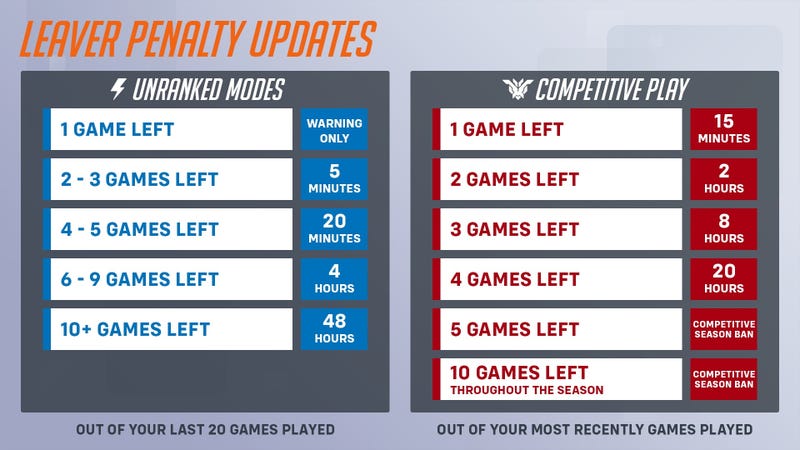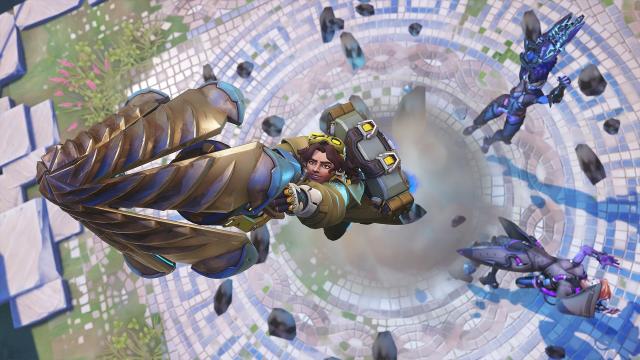Overwatch 2 is getting some big changes in its tenth season starting April 16, with some of the biggest impacting how it handles the social elements of competitive play. Blizzard laid out its plans to make Overwatch 2 “a fun, safe, and inclusive experience” through a blog post on the shooter’s official website. While some of these are good changes that will make Overwatch 2 better, some seem shortsighted about how infrastructures outside of players’ control will affect the game if these changes stay in place.
Wide groups let players of different ranks group up
The first of these updates will be the implementation of “Wide Groups,” which will allow players to group up with players of any rank without limitations. However, if you have players with a wide skill division, there will be longer queue time as these groups will only be pitted against other wide groups. Given that these matches will have overlapping ranks, Overwatch 2 won’t weigh wins and losses in these games to your competitive rank as heavily as standard matches.
The punishment for leavers is well-intentioned but misguided
That all sounds well and good, but some of the more questionable changes come in how Blizzard will handle people who leave games moving forward. This will apply to both unranked and competitive modes, though the punishments are much more severe in ranked play. Overwatch 2 will implement penalties for leaving games, and has laid out the consequences for repeat offenders. For those playing Quick Play or Arcade modes, leaving one game will merit a warning, but if you continue to leave, you’ll be locked out of queuing for matches for anywhere from a few minutes on early infractions to as much as 48 hours for those who leave 10 or more games out of their last 20 played.
Competitive leavers get punished right out of the gate, as leaving one game results in a 15-minute ban. If you leave up to 5 games, however, you’ll be banned for an entire competitive season. Initially, these disconnects are measured in your recent games played, but if you disconnect 10 times across the entire competitive season, you’ll receive a season-long ban, just like if you left five games in rapid succession.

That would be a fitting punishment in a perfect world with flawless internet infrastructure. But here’s the problem: Overwatch 2 doesn’t differentiate between someone intentionally leaving a match and someone being disconnected through an internet outage or server disconnection.
“Remember, deliberately leaving or having a disconnection still counts as leaving,” the blog post reads. “While we understand it is often not intentional, it still greatly impacts the high-stakes experience that Competitive provides. While any player can have a technical issue when playing, it’s important not to jump back into Competitive Play until you are confident that any technical issue is resolved.”
Your cat knocks your router over and unplugs it? That counts as a mark against you. Your power goes out? Strike two. An internet outage in your area? You might as well have said your supports weren’t healing you and left the match. As I write this, the internet in my office is going in and out while I’m listening to Spotify. Good thing I’m not playing Overwatch 2 competitive right now. Those are just some issues you might run into on your end, but it’s also possible that Overwatch 2 will have its own server problems and disconnect you while your internet is doing just fine. Right now, it sounds like Blizzard’s answer to this is to essentially say, “figure it out.” The argument that bad faith actors will find workarounds if there’s any leniency is fair, but there’s got to be a middle ground here in terms of how the game registers a disconnection, such as if someone disconnects through the in-game menu or if they lose connection while still actively moving in-game.
Overwatch 2 is updating existing safety features
Streamer Protect, a feature that lets users hide their usernames on their own displays so they can stream without fear of disruptive players joining their games, is getting expanded. The feature will now be called “Hide My Name” and will give you a fake, randomly generated username during matches. It will be shown on your own screen, as well as on teammates’ and opponents’ displays. However, your actual username will be visible from the Social Menu after a match, and reports submitted about those players will still affect their actual account, not the fake one generated by Hide My Name.
Also coming in season 10 is an update to the Avoid As Teammate feature, allowing players to add up to 10 players to their list, up from the previous three. You’ll also be able to prioritize those players, pinning them so they don’t fall off the list if you add a new player. Overwatch 2 is also making changes to try and lessen disruptive chatter, both in text and voice chat. Starting in season 10, any player who has been demoted to a Level 0 endorsement rating after being reported for breaking the game’s code of conduct will be unable to use voice and text chat until they reach Level 1 again. Blizzard is also removing access to team and match chat for spectators, as it’s not currently possible to report spectators in matches through the usual report systems.
In the future, Blizzard will be adding an “easier-to-use” interface for reporting players mid-match, implementing user surveys after matches to send feedback on “new modes, events, and features,” and giving feedback about safety features. These will appear as a link and/or QR code after you finish the post-match breakdown, and will be optional.
A lot of these sound like smart additions, but those leaver penalties affecting those who are disconnected by a poor connection, server issues, or any other legitimate problems don’t sit right with me. I used to live in a rural area with piss-poor internet, and while I could play Overwatch well enough most days, there were times when I’d get disconnected. All that other stuff, though? Good shit. Some of my earliest Overwatch memories are of toxic behavior, and I stopped using the voice chat almost immediately. Anything to help curb that is okay in my book.

Leave a Reply